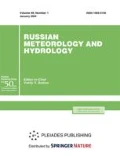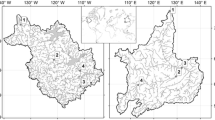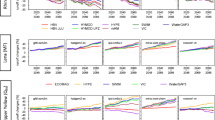Abstract
For two hydrological models, the ECOMAG and SWAP, the hypothesis is checked that a model which has successfully passed the test based on observational data is more efficient for assessing future hydrological consequences of climate change than the models which did not pass the test. The efficiency is evaluated using two criteria: the robustness of a model and the uncertainty of simulation results. Three versions of each model constructed for the basins of the Lena and Mackenzie rivers are examined: the model whose parameters are set a priori (without calibration), the model which was calibrated against runoff hydrographs at the outlet, and the model which was calibrated against runoff hydrographs at several gaging stations of the river network. The estimates of possible changes in the river runoff by the end of the 21st century are obtained using data of global climate models. It is shown that the hydrological model which successfully passed the proposed testing procedure is more effective for assessing climate change impact on the river runoff.

Similar content being viewed by others
REFERENCES
E. M. Gusev and O. N. Nasonova, Modeling Heat and Moisture Exchange between the Land Surface and Atmosphere (Nauka, Moscow, 2010) [in Russian].
Yu. G. Motovilov and A. N. Gel’fan, Runoff Formation Models in the Problems of River Basin Hydrology (RAN, Moscow, 2018) [in Russian].
L. Coron, V. Andreassian, C. Perrin, J. Lerat, J. Vaze, M. Bourqui, and F. Hendrickx, “Crash Testing Hydrological Models in Contrasted Climate Conditions: An Experiment on 216 Australian Catchments,” Water Resour. Res., 48 (2012).
L. Coron, V. Andreassian, C. Perrin, M. Bourqui, and F. Hendrickx, “On the Lack of Robustness of Hydrologic Models Regarding Water Balance Simulation: A Diagnostic Approach Applied to Three Models of Increasing Complexity on 20 Mountainous Catchments,” Hydrol. Earth Syst. Sci.,18 (2014).
A. Gelfan, D. Gustafsson, Y. Motovilov, B. Arheimer, A. Kalugin, I. Krylenko, and A. Lavrenov, “Climate Change Impact on the Water Regime of Two Great Arctic Rivers: Modeling and Uncertainty Issues,” Climatic Change, No. 3, 141 (2017).
A. Gelfan and T. Millionshchikova, “Validation of a Hydrological Model Intended for Impact Study: Problem Statement and Solution Example for Selenga River Basin,” Water Resour., 45 (2018).
Y. M. Gusev, O. N. Nasonova, E. E. Kovalev, and G. V. Aizel, “Modelling River Runoff and Estimating Its Weather-related Uncertainty for 11 Large-scale Rivers Located in Different Regions of the Globe,” Hydrol. Res., No. 4,49 (2018).
V. Klemes, “Operational Testing of Hydrological Simulation Models,” Hydrol. Sci. J., 31 (1986).
V. Krysanova, C. Donnelly, A. Gelfan, D. Gerten, B. Arheimer, F. Hattermann, and Z. W. Kundzewicz, “How the Performance of Hydrological Models Relates to Credibility of Projections under Climate Change,” Hydrol. Sci. J., No. 5, 63 (2018).
V. Krysanova, T. Vetter, S. Eisner, S. Huang, I. Pechlivanidis, M. Strauch, A. Gelfan, R. Kumar, V. Aich, B. Arheimer, A. Chamorro, A. van Griensven, D. Kundu, A. Lobanova, V. Mishra, S. Plotner, J. Reinhardt, O. Seidou, X.-Y. Wang, M. Wortmann, X.-F. Zeng, and F. Hattermann, “Intercomparison of Regional-scale Hydrological Models and Climate Change Impacts Projected for 12 Large River Basins Worldwide—A Synthesis,” Environ. Res. Lett., No. 10,12 (2017).
Z. W. Kundzewicz, V.Krysanova, R. E. Benestad, O. Hov, M. Piniewski, and I. M. Otto, “Uncertainty in Climate Change Impacts on Water Resources,” Environ. Sci. Policy, 79 (2018).
J. C. Refsgaard, H. Madsen, V. Andreassian, K. Arnbjerg-Nielsen, T. A. Davidson, M. Drews, D. P. Hamilton, E. Jeppesen, E. Kjellström, J. E. Olesen, T. O. Sonnenborg, D. Trolle, P. Willems, and J. H. Christensen, “A Framework for Testing the Ability of Models to Project Climate Change and Its Impacts,” Climatic Change, 122 (2013).
B. D. Santer, T. M. L. Wigley, J. S. Boyle, D. J. Gaffen, J. J. Hnilo, D. W. Nychka, D. Parker, and K. E. Taylor, “Statistical Significance of Trends and Trend Differences,” J. Geophys. Res., No. D6, 105 (2000).
G. Thirel, V. Andreassian, C. Perrin, J.-N. Audouy, L. Berthet, P. J. Edwards, N. Folton, C. Y. Furusho, A. Kuentz, J. Lerat, G. Lindstrom, E. Martin, T. Mathevet, R. Merz, J. Parajka, D. Ruelland, and J. Vaze, “Hydrology under Change: An Evaluation Protocol to Investigate How Hydrological Models Deal with Changing Catchments,” Hydrol. Sci. J., No. 7, 60 (2015).
K. K. Yilmaz, H. V. Gupta, and T. Wagener, “A Process-based Diagnostic Approach to Model Evaluation: Application to the NWS Distributed Hydrologic Model,” Water Resour. Res.,44 (2008).
Funding
The research was supported by the Russian Science Foundation (the simulations based on the SWAP model were supported by the grant 16-17-10039 and those based on the ECOMAG model were supported by the grant 19-17-00215) and by the theme of the State Assignment of Water Problems Institute of Russian Academy of Sciences 0147-2018-0003 (the creation of databases on the underlying surface characteristics).
Author information
Authors and Affiliations
Corresponding author
Additional information
Russian Text ©The Author(s), 2020, published in Meteorologiya i Gidrologiya, 2020, No. 5, pp. 77-85.
About this article
Cite this article
Gel’fan, A.N., Kalugin, A.S., Krylenko, I.N. et al. Testing a Hydrological Model to Evaluate Climate Change Impact on River Runoff. Russ. Meteorol. Hydrol. 45, 353–359 (2020). https://doi.org/10.3103/S1068373920050064
Received:
Revised:
Accepted:
Published:
Issue Date:
DOI: https://doi.org/10.3103/S1068373920050064




